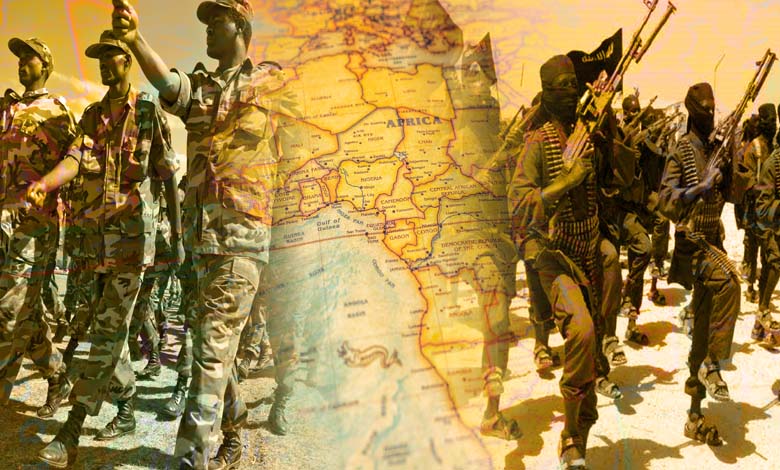Gold and Drones: Alternative Funding and New Maps of Terrorist Threats in the African Sahel

Terrorist groups in the African Sahel are adopting new strategies to gain control over this resource-rich region, including the slow encirclement of capital cities — effectively isolating them from their vital surroundings and cutting off supply routes.
-
Breach of Fortified Cities and Strategic Attacks: Terrorism Unsettles the African Sahel
-
Arming Dynamics of Extremist Groups in the African Sahel: What Is the Source of Their Arsenal?
These groups, combining armed militancy, economic organization, and religious outreach, exploit the erosion of state institutions, security vacuums, and social marginalization.
According to experts, the current wave of terrorism in the region has evolved beyond mere security escalation. It now marks a new phase of threats driven by the use of technology (drones), the gold economy, and the expansion of operations beyond Mali, Burkina Faso, and Niger, reaching into the edges of Benin and Senegal.
-
The African Sahel: The deadliest hotspot of violence on the continent for the fourth consecutive year
-
Armed groups deliberately kidnap Europeans in the African Sahel: What are their motives?
“Capital Strangulation” Strategy
Through a series of escalating attacks, terrorist groups have recently targeted strategic corridors in the Sahel alliance countries — from the outskirts of Bamako, to the coordinated attack on Timbuktu, and the temporary seizure of Djibo in Burkina Faso, a city of nearly 300,000 residents.
François Soudan, editor-in-chief of the French magazine Jeune Afrique, explained this trend in an interview with French radio RFI, stating that the current strategy aims to “strangle the capitals remotely by gradually encircling them” through pressure on key transport routes and repeated assaults on critical infrastructure.
-
Rising Terrorist Activities in the African Sahel… “Global Report”
-
Mauritania Warns: The “African Sahel” Region among the World’s Most Severe Crisis Hotspots
Rural Expansion and Unprecedented Pressure
This shift is reflected in widespread roadside ambushes and attacks on sensitive facilities — creating an unprecedented form of pressure. While jihadist groups lack the capacity to fully control urban centers, their rural presence has become “widespread and dynamic,” according to Soudan.
The integration of drones into field operations has become one of the most notable changes, with these devices now part of the arsenal of both armed groups and national armies in Mali, Burkina Faso, and Niger.
-
Rise in Al-Qaeda activities in the African Sahel… What factors led to this?
-
A Criminal Court in Africa’s Sahel: Necessity or Rebellion?
Zakat and Gold Replacing Ransoms
As the capacity to kidnap foreigners declines — due to military and intelligence clampdowns — these groups are turning to alternative sources of funding. Soudan notes that zakat has become a form of taxation imposed on local populations, either in cash, livestock, or crops — creating a parallel economy that supports militant activities.
Meanwhile, artisanal gold mining, especially in the “tri-border area” between Mali, Niger, and Burkina Faso, has become a crucial pillar of the groups’ economy. They control traditional mines and impose levies on miners.
-
Commitment to the Atlantic Initiative Sets the Stage for Broader Cooperation between Morocco and Sahel Countries
-
“He insulted all Africans”: Macron’s Comments Spark Repercussions in Burkina Faso
Cross-Border Expansion
Soudan warns that terrorist operations are no longer confined to the Sahel Alliance States (AES) but are now reaching into Benin and Togo, with attempted infiltrations into Senegal and Mauritania through Salafist preachers active in marginalized communities — a trend recently documented by the Timbuktu Institute.
Professor Souleymane Boukari Diallo, a conflict expert and lecturer at the University of Niamey, said: “What’s happening in the Sahel is not just a security threat. It reflects the failure of states to redistribute wealth and recognize local identities. The expansion of terrorist groups is a direct result of the erosion of trust between citizens and military institutions.”
-
With the “African Initiative,” Russia Strengthens Its Influence in Burkina Faso
-
Hundreds of African Migrants Victims of Organ Trafficking Voluntarily and Coerced
He added that the focus of attacks around capital cities carries political symbolism — aimed at undermining the legitimacy of central governments and shaking public confidence.
A New Phase of Organization and Influence
In the same vein, Dr. Aïssata Demba, a West Africa extremism specialist at the Center for African Studies in Paris, said: “The use of zakat and drones indicates we’ve entered a new phase. These actors are no longer just militants hiding in the bush — they are capable of building parallel economies and spreading structured religious narratives in historically marginalized areas.”
-
The Growing Jihadist Violence in the Sahel
-
The Moroccan diplomacy undermines Algerian plots in the African Parliament
Demba warns that the overlap between Salafist ideology and unmet social needs makes fragile communities especially susceptible to infiltration, particularly in southern Mauritania and northern Benin, where economic fragility intersects with a lack of public services.
She concluded that terrorism in the Sahel is expanding geographically and evolving technically and strategically, relying on nontraditional financial and religious tools. The risk of fragile West African states becoming new strongholds for extremist groups is increasing, especially as social marginalization — a key driver of radicalization — continues to be ignored.
-
Algeria creates its isolation by punishing African countries joining the Atlantic initiative
-
African countries discuss the implementation of the royal initiative for access to the Atlantic in Marrakech












